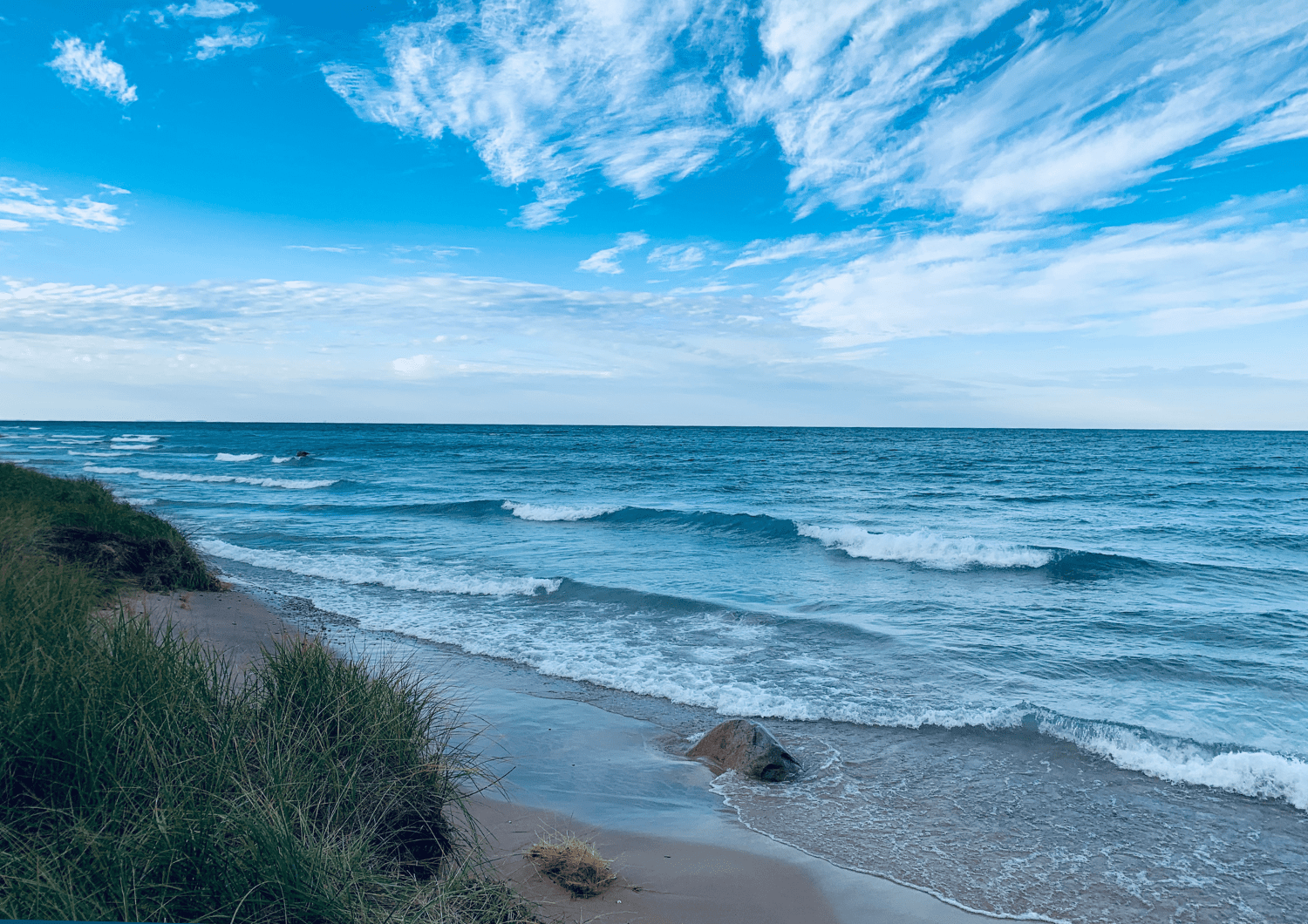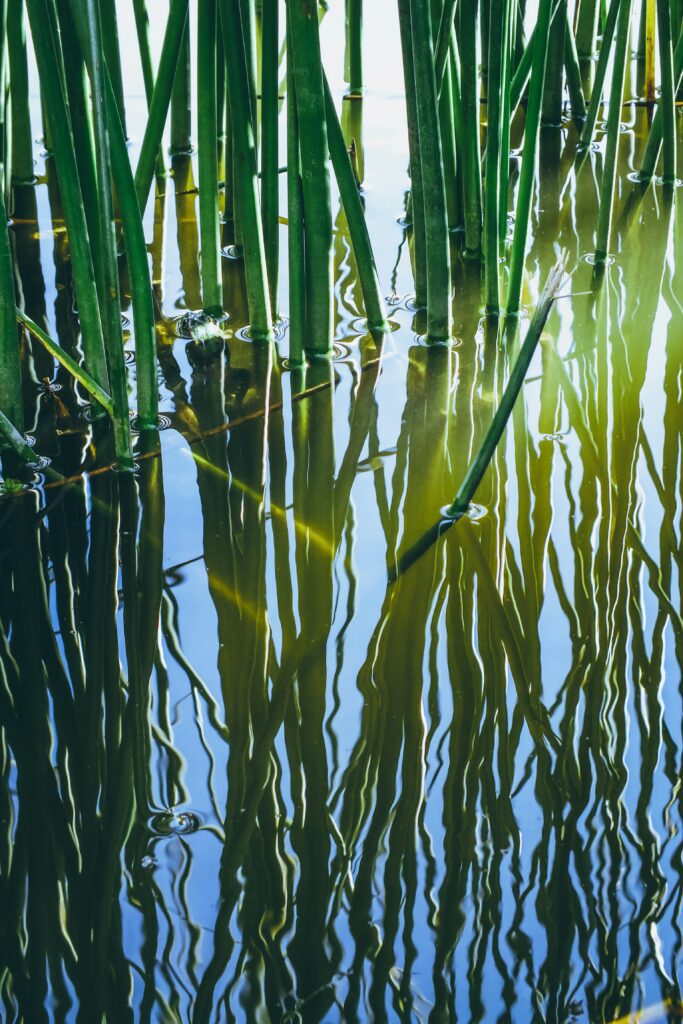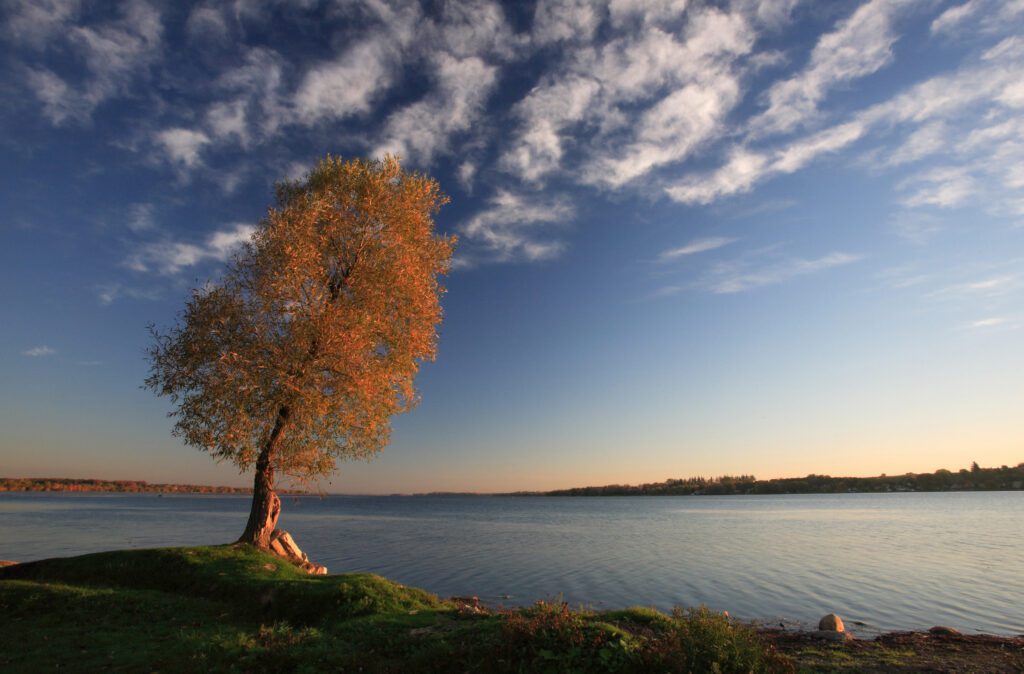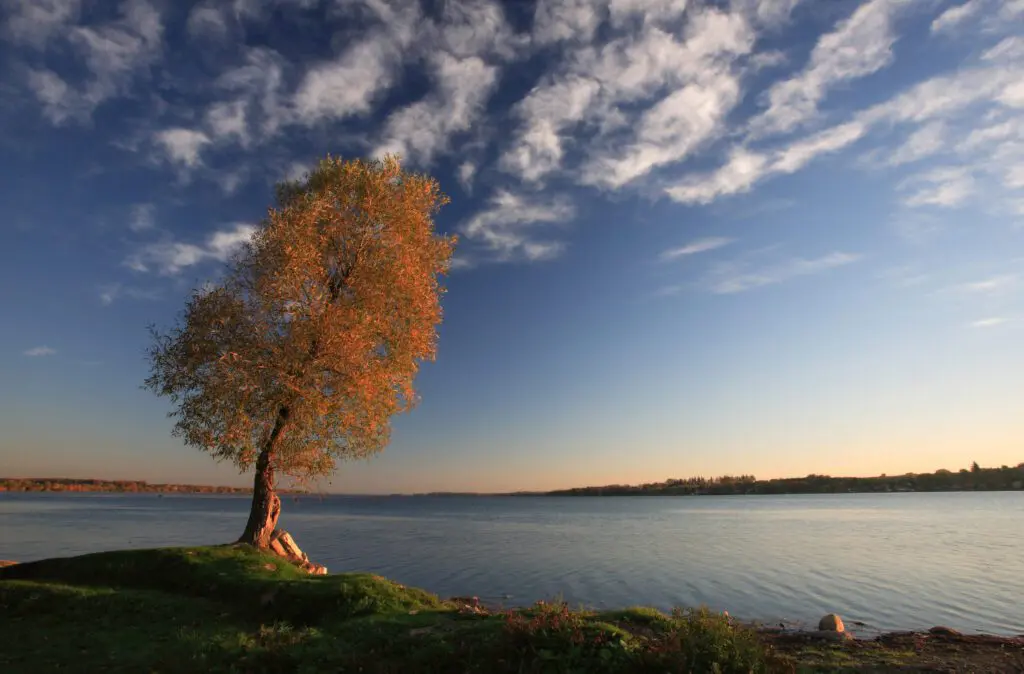While Enbridge continues to spin a narrative that it can be trusted to act in the best interest of the Great Lakes, its actions tell a different story.
In order to keep the dangerous 70-year-old Line 5 oil pipeline in operation, Enbridge is violating tribal rights and sovereignty in both Wisconsin and Michigan. In a previous blog, we discussed Line 5 and tribal rights of the Bad River Band of Lake Superior Chippewas in Wisconsin. This blog will focus on Michigan, where Enbridge is using the same aggressive tactics to circumvent tribal rights — with support from the Government of Canada.
Enbridge’s horrible track record with oil spills
Enbridge has a horrible track record when it comes to oil spills, and consistently gaslights Indigenous Nations by downplaying the risks posed by Line 5. Significant spills have already occurred along the Line 5 route across Michigan. It’s not a matter of if, but rather when, the next spill will happen.
The fossil fuel company claims it can prevent Line 5 from spilling into high-risk areas such as the Straits of Mackinac. However, expert models have shown that in the event of a spill, it would take Enbridge at least 13.5 minutes to shut off the pipeline in this area — where currents can be ten times the strength of those at Niagara Falls.
In that time, over 1 million litres of oil would gush into the Great Lakes, engulfing up to 1100 km of shoreline across the Straits, Lake Michigan, and Lake Huron with dirty tar sands oil. And that’s in a best-case scenario. In 2010, it took Enbridge 17 hours to stop oil from bursting out of one of its pipelines into the Kalamazoo River, resulting in one of the largest inland oil spills in U.S. history.
Enbridge portrays itself as a “responsible corporate citizen”, but above all, it is the owner of the world’s largest crude oil pipeline network and in the business of moving fossil fuels.
The Anishinaabeg: Great Lakes caretakers and guardians for 13,000 years
Amidst global freshwater, climate, and biodiversity crises, we must honour and remember that it is Indigenous Nations of the Great Lakes who are the original stewards of these water bodies. The Anishinaabeg are motivated to ensure the health of the Great Lakes for present and future generations, as are their close Indigenous kin of many nations across their respective homelands and homewaters.
They have been living in harmonious relation with these great freshwater lakes for at least 13,000 years, and are motivated by the Seventh Generation Principle, which teaches that the decisions we make today must ensure a healthy earth for the next seven generations to come. This Principle teaches us that we all have roles and responsibilities to be in good relation with the earth and be good ancestors for those still to come.
The Line 5 pipeline is an existential threat to Anishinaabeg Tribes across Michigan
Enbridge and the Government of Canada argue that the ongoing operation of Line 5 does not violate the Indigenous rights of the Tribes across Michigan. However, the pipeline poses an existential threat to much of the Great Lakes ecosystem and thus threatens Indigenous ways of life. These ways of life include centuries of cultural teachings and knowledge passed down through generations. These teachings and ways of life are inextricably linked to the Anishinaabeg, their identity, and the preservation and health of the Great Lakes ecosystems. Through these teachings and ways of being, the Indigenous Nations of the Great Lakes have lived in harmony and ongoing relations with the natural world for countless generations.
During colonization in the 1800s, Anishinaabeg Tribal Nations across Michigan signed treaties in 1836, 1837, 1842, and 1854 with the United States government. These treaties enshrine the Tribes’ rights to hunt, fish, and gather in their traditional territories. Line 5 directly threatens the Anishinaabeg peoples’ ability to exercise these rights within the ecosystems that sustain them.
President (Chief) Whitney Gravelle of the Straits of Mackinac (Bay Mills Indian Community) expressed, “It’s more than just our food and water that’s at stake. It’s our connectedness to the natural world, our cultural identity, and deep sense of community that this landscape keeps alive. This is not just a tribal fight; we are fighting on behalf of all who value the Great Lakes and our environment”.
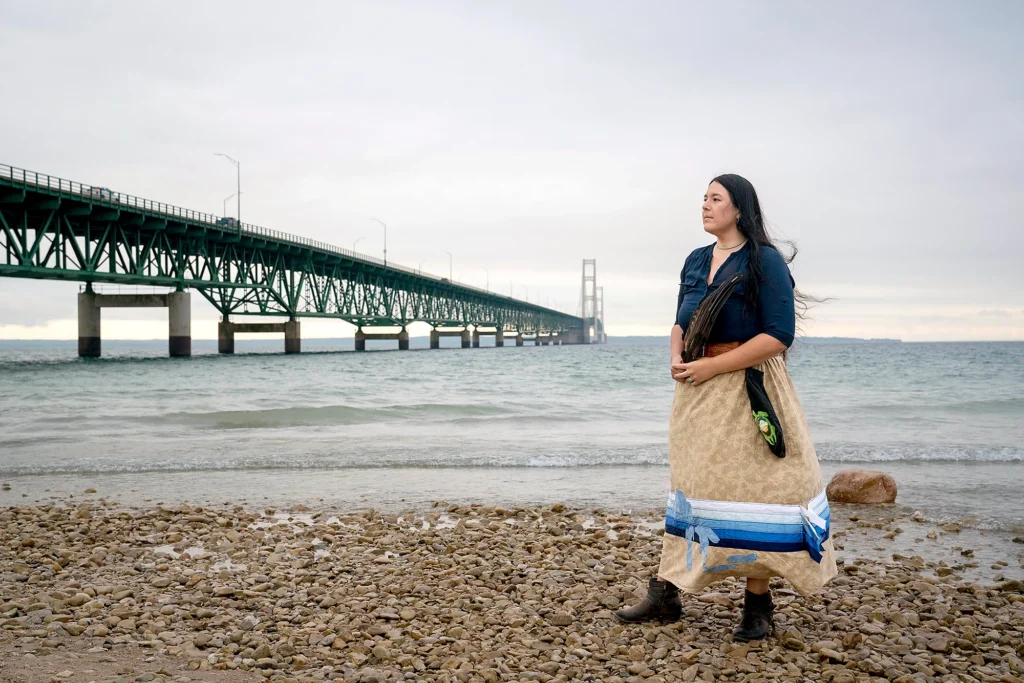

Today, all 12 federally recognized Tribal Nations in Michigan have passed resolutions calling for the closure of Line 5. Bay Mills Indian Community has also banished Enbridge from its tribal lands at the Straits of Mackinac under tribal law—a move not taken lightly by the Tribe. Despite this, Enbridge refuses to comply, and the Canadian federal government is working alongside the fossil fuel giant, prioritizing corporate interests over Indigenous rights.
When Enbridge goes to court, Canada has its back
Enbridge is currently in court, fighting Line 5 shutdown orders from both the Michigan Governor and the U.S. Attorney General. These orders seek to uphold tribal rights, honour the treaties, and protect the Great Lakes for all communities. Instead of lending its support, Canada has invoked a little-known and previously unused 1977 Canada-U.S. pipeline treaty to block Michigan’s shutdown orders.
It’s essential to note that the treaties between the U.S. and Tribal Nations predate the Canada-U.S. pipeline treaty. Furthermore, when the 1977 pipeline treaty was created and signed into colonial law, Canada and the U.S. failed to include Indigenous Nations in the process.
Canada’s use of this treaty, and its efforts to protect Enbridge’s interests over Indigenous rights, contradict its stated commitment to reconciliation. The use of the 1977 Canada-U.S. pipeline treaty to keep Line 5 open is a glaring example of how Canada continues to prioritize resource extraction over Indigenous rights and peoples. This constitutes environmental racism and colonial violence.
Since the establishment of Canada and the fossil fuel industry, there has been ongoing direct and systemic violence towards Indigenous Nations and peoples. Indigenous peoples have endured violent displacement, ongoing harm, and violence to their cultures, homelands and homewaters — often to make way for extractive industries. Pipelines represent just one aspect of the ongoing harm and forced displacement of Indigenous Nations from their traditional lands and watersheds.
Indigenous Nations’ inherent water rights must be upheld
For many Indigenous peoples, inherent rights are rights for self-determination. These rights go hand in hand with the responsibilities to care for the land and water and share them with our plant and animal relatives.
The Anishinaabeg Nations across Wisconsin, Michigan, and Ontario are united in their fight for the shutdown of Line 5 in the name of Great Lakes protection. Canada has a duty to uphold Indigenous Nations’ inherent water rights. It must also revoke its use of the 1977 pipeline treaty, and work with the United States and Indigenous Nations to support the closure of Line 5.
Key Takeaways
- The ongoing operation of the Line 5 pipeline threatens Lake Michigan, Lake Huron, and the Straits of Mackinac. The pipeline has already leaked numerous times and will leak again.
- Line 5 threatens the inherent and treaty rights of the Anishinaabeg Tribes across Michigan. The treaties enshrine the Tribes’ rights to hunt, fish, and gather in their traditional territories. Line 5 jeopardizes the Anishinaabeg people’s ability to exercise these rights and endangers the ecosystems that sustain them.
- Enbridge and Canada are actively trying to circumvent the inherent and treaty rights of the Anishinaabeg Tribes across Michigan. Canada’s use of the 1977 Canada-U.S. pipeline — a treaty which did not consider or include Indigenous rights and is preceded by the treaties made between the Tribal Nations and the U.S. — is a glaring example of Canada’s disregard for Indigenous rights.
On a personal note:
For many Indigenous peoples, it is not possible to separate the essence, fabric, and nature of our being from the lands, waters, air, skies, and ecosystems that have been a part of us since time immemorial.
My background is mixed Métis Nation (Lac Ste. Anne/manitou sakhahigan, ‘spirit of the lake’) and British-Canadian. I grew up in Southern Ontario and am a water protector and member of the Great Lakes ecosystem and I acknowledge the sacred covenant with the Great Lakes that we all hold as peoples who depend upon these water bodies. It is our duty to protect these freshwater bodies in alignment with the Seventh Generation Principle. I stand united with Anishinaabeg kin who are calling for the permanent closure of Line 5. One of the most essential elements that creation and life are dependent upon, is water, nibi in Anishinaabemowin. The Great Lakes hold 84 per cent of Turtle Island’s surface freshwater.
The first treaties that we hold as Indigenous peoples are with the natural world. The first treaties with the natural world prevail over any treaty made since colonization. These treaties will always be the guiding principles of living in harmony with the lands, the waters, the trees and plants, the four-legged relatives, the insects, the soil, the air, and everything that holds life and gives us life. These are the treaties that we all must honour and uphold in the highest regard. And it is in the name of protecting the great waters of the Great Lakes and of the Great Turtle Island, that we must shut down Line 5 for good.


